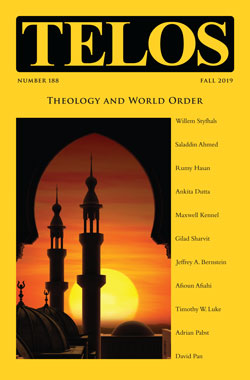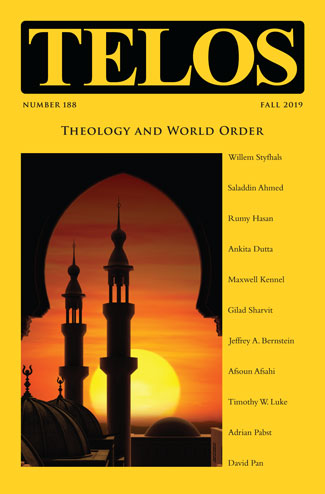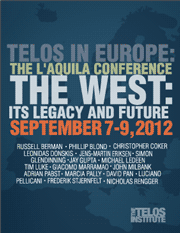By Maxwell Kennel · Friday, November 15, 2019 Maxwell Kennel’s “Periodization and Providence: Time and Eternity between Nietzsche’s Zarathustra and Augustine’s Confessions” appears in Telos 188 (Fall 2019). Read the full article at the Telos Online website, or purchase a print copy of the issue in our online store. Individual subscriptions to Telos are available in both print and online formats.
 In order to address the politics of temporal regulation and periodization, while considering ways in which competing religious and secular narratives construct contemporary subjectivity, this article compares the quasi-autobiographical narratives of Friedrich Nietzsche’s Thus Spoke Zarathustra and Saint Augustine’s Confessions. Looking beneath the surface differences between these two works, this study draws out surprising affinities and continuities between Zarathustra and the Confessions and compares each work’s vision of time and eternity. By examining Zarathustra’s parable of the gate and its punctuating moment (Augenblick) alongside Augustine’s notion of the distentio animi in book 11 of the Confessions, this article questions competing Christian and anti-Christian narratives and their use of teleology and providence in the periodization of time, and concludes by contesting these narratives from the standpoint of postsecular critique. In order to address the politics of temporal regulation and periodization, while considering ways in which competing religious and secular narratives construct contemporary subjectivity, this article compares the quasi-autobiographical narratives of Friedrich Nietzsche’s Thus Spoke Zarathustra and Saint Augustine’s Confessions. Looking beneath the surface differences between these two works, this study draws out surprising affinities and continuities between Zarathustra and the Confessions and compares each work’s vision of time and eternity. By examining Zarathustra’s parable of the gate and its punctuating moment (Augenblick) alongside Augustine’s notion of the distentio animi in book 11 of the Confessions, this article questions competing Christian and anti-Christian narratives and their use of teleology and providence in the periodization of time, and concludes by contesting these narratives from the standpoint of postsecular critique.
Continue reading →
By David Pan · Monday, September 9, 2019 Telos 188 (Fall 2019): Theology and World Order is now available for purchase in our store. Individual subscriptions to Telos are also available in both print and online formats.
 It would be naive to consider the question of global political order without engaging in debates about theology. Not only has it become clear that religious conflicts drive political ones, the very attempt to move “beyond” religion must be understood in terms of its theological meaning. The postsecular turn has not meant a return to religion so much as a realization that secularization was never a turn away from religion in the first place but rather itself a specific theological alternative among many. Accordingly, if our deepest political conflicts arise as consequences of theological disputes, we must address theology directly in order to get to the roots of major conflicts. Not only clear cases, such as conflicts between Israelis and Palestinians or between Shiite and Sunni Muslims, but also those between the United States and China revolve around theological issues that shape political and military conflict. Yet, our current approaches rely on political scientific and military calculations that have not yet been able to evaluate theology as a key and deciding factor in such conflicts. As the U.S. military and intelligence agencies debate the threat that Islamic State poses in Afghanistan, for instance, a key consideration should be the character and prospects of Islamic State’s theology, as well as the broader question of the role of theology in deciding political conflict. This issue of Telos engages in this discussion by considering how conceptions of world order arise from specific theologies. It would be naive to consider the question of global political order without engaging in debates about theology. Not only has it become clear that religious conflicts drive political ones, the very attempt to move “beyond” religion must be understood in terms of its theological meaning. The postsecular turn has not meant a return to religion so much as a realization that secularization was never a turn away from religion in the first place but rather itself a specific theological alternative among many. Accordingly, if our deepest political conflicts arise as consequences of theological disputes, we must address theology directly in order to get to the roots of major conflicts. Not only clear cases, such as conflicts between Israelis and Palestinians or between Shiite and Sunni Muslims, but also those between the United States and China revolve around theological issues that shape political and military conflict. Yet, our current approaches rely on political scientific and military calculations that have not yet been able to evaluate theology as a key and deciding factor in such conflicts. As the U.S. military and intelligence agencies debate the threat that Islamic State poses in Afghanistan, for instance, a key consideration should be the character and prospects of Islamic State’s theology, as well as the broader question of the role of theology in deciding political conflict. This issue of Telos engages in this discussion by considering how conceptions of world order arise from specific theologies.
Continue reading →
By Greg Melleuish · Monday, February 11, 2013 The following paper was presented at Telos in Europe: The L’Aquila Conference, held on September 7-9, 2012, in L’Aquila, Italy.
 We live in an age of History Wars. We live in an age of History Wars.
Most of them are national in focus.
There is, however, one that touches on the issue of Western civilization, and that is the perceived conflict between Western civilization and world history.
Advocates of world history castigate Western civilization for pretending to be universal when, in fact, it is partial and prejudiced.
Continue reading →
|
|
 In order to address the politics of temporal regulation and periodization, while considering ways in which competing religious and secular narratives construct contemporary subjectivity, this article compares the quasi-autobiographical narratives of Friedrich Nietzsche’s Thus Spoke Zarathustra and Saint Augustine’s Confessions. Looking beneath the surface differences between these two works, this study draws out surprising affinities and continuities between Zarathustra and the Confessions and compares each work’s vision of time and eternity. By examining Zarathustra’s parable of the gate and its punctuating moment (Augenblick) alongside Augustine’s notion of the distentio animi in book 11 of the Confessions, this article questions competing Christian and anti-Christian narratives and their use of teleology and providence in the periodization of time, and concludes by contesting these narratives from the standpoint of postsecular critique.
In order to address the politics of temporal regulation and periodization, while considering ways in which competing religious and secular narratives construct contemporary subjectivity, this article compares the quasi-autobiographical narratives of Friedrich Nietzsche’s Thus Spoke Zarathustra and Saint Augustine’s Confessions. Looking beneath the surface differences between these two works, this study draws out surprising affinities and continuities between Zarathustra and the Confessions and compares each work’s vision of time and eternity. By examining Zarathustra’s parable of the gate and its punctuating moment (Augenblick) alongside Augustine’s notion of the distentio animi in book 11 of the Confessions, this article questions competing Christian and anti-Christian narratives and their use of teleology and providence in the periodization of time, and concludes by contesting these narratives from the standpoint of postsecular critique. 
 We live in an age of History Wars.
We live in an age of History Wars. 

